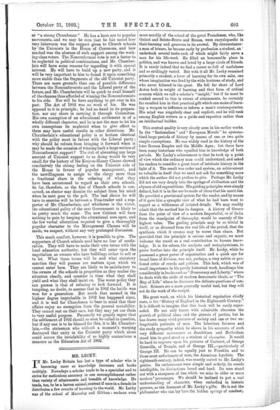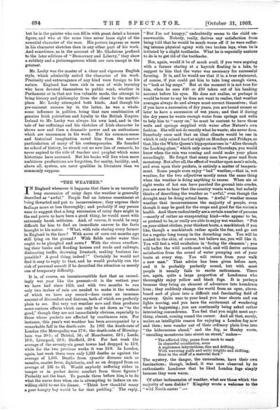MR. LECKY.
IN Mr. Lecky. Britain has lost a type of scholar who is becoming rarer as knowledge increases and books multiply. Nowadays a scholar tends to be a specialist and to strive for meticulous accuracy in 'one accomplishment rather than variety of attainments - and breadth of knowledge. He tends, too, to be a barren animal, content if once in a decade he distributes a few crumbs of learning to the world. Mr. Lecky was of the school of Macaulay and Gibbon uerhaps even more notably of the school of the great Frenchmen, who, like Guizot and Sainte-Beuve and Renan, were encyclopaedic in their learning and generous in its avowal. By circumstance' a man of leisure, he became early by profession a student, an '. undertook several tasks each of which might fairly serve a man for his life-work. He filled an honourable place in politics, and was known and loved by a large circle of friends. It is rarely indeed that we find a career so full of usefulness and so strikingly varied. But with it all Mr. Lecky remained primarily a student, a lover of learning for its own sake, one whose imagination was fired by the wide horizons of study, and who never faltered in the quest. He fell far short of Lord Acton both in weight of learning and that form of critical acumen which we call a scholar's " insight," but if he must be ranked second to him in extent of attainments, he certainly far excelled him in that practical gift which can make of learn- ing a weapon to influence or inform a man's contemporaries. His mind was singularly clear and explicit, and he will rank among English writers as a guide and expositor rather than an intellectual builder.
This central quality is very clearly seen in his earlier works. In the "Rationalism" and " European Morals" he systema- tised large periods of history by means of one or two quite simple conceptions. He was widely read in the history of the later Roman Empire and the Middle Ages ; but there have been many historians who equalled him in knowledge of both periods. Mr. Lecky's achievement is that he took up a point of view which the ordinary man could understand, and asked his readers to consider a great tract of intricate history in the light of it. The result was order and system, an achievement so valuable in itself that we need not ask for something more which the author did not profess to give. Perhaps Mr. Lecky did not see very deeply into the springs of civilisation and the abysses of old superstitions. His guiding principles were simply defined, but it is in the use he made of them that his merit lies.. He provided a provisional system for the reader, and by means of it gave him a synoptic view of what he had been wont to regard as a wilderness of isolated details. We may readily admit that the method has its dangers. A history of Greece from the point of view of a modern Imperialist, or of India from the standpoint of theosophy, would be scarcely of the highest value. The guiding principle may be so trivial in itself, or so divorced from the real life of the period, that the synthesis which it creates may be worse than chaos. But provided that the principle is serious and organic, we must welcome the result as a real contribution to human know- ledge. It is for others, the analysts and metaphysicians, to probe further into the principle itself. Mr. Lecky, while he possessed a great power of organisation and a quick eye for broad lines of division, was not, perhaps, a very subtle or pro- found critic of creeds and policies. This lack, which was of small importance in his purely historical work, handicaps him considerably in books such as " Democracy and Liberty," where he deals with the strife of modern democratic ideals, or " The Map of Life," where he discusses the delicate questions of con- duct. ' Scissors are a more generally useful tool, bat they will not do the work of the scalpel.
His great work, on which his historical reputation chiefly rests, is his "History of England in the Eighteenth Century." It is difficult to imagine that this book will be easily super- seded. He not only traces with admirable clearness the growth of political ideas and the genesis of parties, but he has drawn many vivid pictures of society and one or two un- forgettable portraits of men. The laborious fairness and the ready sympathy which he shows in his accounts of such very different movements as Jacobitism and Methodism stood him in good stead as a student of character. It would be hard to improve upon his pictures of Carteret, of George Grenville, of Temple, and of George 1IL—particularly of George III. He can be equally just to Franklin and' to those most unfortunate of men, the American loyalists. The eighteenth century, indeed, was exactly suited to Mr. Lecky's enius. Its enthusiasms were simple and orderly, its creeds intelligible, its distinctions broad and hard. Its men stand out with a sharpness of line which we miss in older or more. modern • personages. We should be inclined to put a real understanding of character, when embodied in historic persons, as the foremost of Mr. Lecky's gifts. He is not the philosopher who can lay bare the hidden springs of conduct;
but he is the painter who can fill in with great detail a human figure, and who at the same time never loses sight of the essential character of the man. His powers impress us more in his character sketches than in any other part of his work. And sometimes, as in the account of Mr. Gladstone prefixed to the later editions of " Democracy and Liberty," they show a subtlety and a picturesqueness which are rare except in the greatest.
Mr. Lecky was the master of a clear and vigorous English style, which admirably suited the character of his work. Preciosity and extravagance of any kind were foreign to his nature. England has been rich in men of wide learning who have devoted themselves to public work, whether in Parliament or in that not less valuable mode, the attempt to bring history and philosophy from the closet to the market- place. Mr. Lecky attempted both kinds. And though his pre-eminent success lay in the latter, he was a whole- some influence in politics, being that rare combination of genuine Irish patriotism and loyalty to the British Empire. Ireland to Mr. Lecky was always his own land, and in the tale of her sufferings and his sketches of Irish character he 'shows now and then a dramatic power and an enthusiasm which are uncommon in his work. But his common-sense and historical imagination saved him from the narrow particularism of many of his contemporaries. He founded no school of history, he struck out no new line of research, he never aspired to the role of teacher and prophet which some historians have assumed. But his books will live when more ambitious productions are forgotten, for sanity, lucidity, and, above all, system, are rarer qualities in literature than we commonly suppose.



















































 Previous page
Previous page